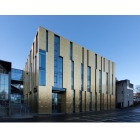Centre for Virus Research chooses Remeha biomass boiler

A low-carbon Remeha biomass heating system helps achieve a BREEAM ‘Excellent’ rating for the Sir Michael Stoker Building at the MRC-University of Glasgow Centre for Virus Research. M&E consultant Arup specified a Remeha Gilles 240 kW pellet biomass boiler for the £10.4 million R&D centre. It operates with a Remeha Gas 610 Eco Pro gas-fired condensing boiler to provide heating.
The Centre for Virus Research was founded in 2010 and is a collaborative project between the University of Glasgow and the Medical Research Council, supported by the Wolfson Foundation and the Wellcome Trust. The new centre brings together for the first time all members of the MRC-University of Glasgow Centre for Virus Research. It was designed by Sheppard Robson.
Scott Winton of contractor Crown House, says, ‘I was impressed with the overall build quality of the boilers and technical support provided by Remeha from delivery through to handover. The gas boilers arrived fully palletised and well protected for the site environment. The pallet design incorporates a ramp to allow the boilers to be wheeled into position without the need for specialist lifting equipment. The biomass boiler and control panel was installed to suit the construction programme on site, allowing sequencing of other trades.’







